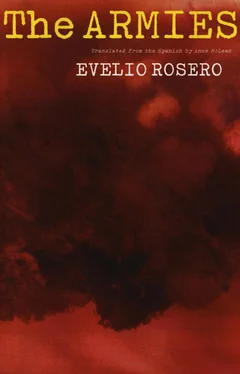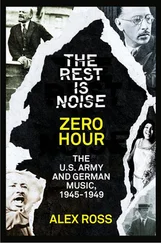Years ago, before the attack on the church, displaced people from other towns used to pass through our town; we used to see them crossing the highway, interminable lines of men and children and women, silent crowds with neither bread nor destinations. Years ago, three thousand indigenous people stayed for a long while in San José, but eventually had to leave due to extreme food shortages in the improvised shelters.
Now it is our turn.
“My house has been turned upside down,” someone shouts. “Who’s going to pay for that?”
Disconsolate laughter is heard.
Father Albornoz begins a prayer.
“In the Lord’s goodness,” he says. “Our Father, who art in heaven …”
The laughter stops. I think of Otilia, my house, the dead cat, the fish, and, a moment later, while the prayer goes on, I manage at last to get out as if held up by all the bodies, which push me to the door; does nobody want to pray?
Outside we hear the cry of Hey, the empanada vendor: the echo bounces along the boiling street. Mechanically, I walk in the direction of the plaza. A group of men, several acquaintances among them, fall silent when I approach. They greet me anxiously. They are talking about Captain Berrío, temporarily relieved of his command while an investigation gets under way.
“They’ll court martial him, and he’ll end up a colonel in another town, as a reward for shooting civilians,” predicts old Celmiro, older than me, and such a good friend that he avoids looking me in the eye.
Why are you frightened to see me, Celmiro? You feel sorry for me, for yourself, but in any case you decide to go home, surrounded by your children.
Voices warn me that landmines have been laid around the town: it will be impossible to leave town without the risk of being blown to bits, where were you, profesor? All the outskirts of San Jose have been mined during the night, they’ve deactivated seventy or more devices, but how many remain? Damn, say the voices, there are tin cans, milk churns full of shrapnel and excrement, to infect the victims’ blood, what bastards, what assholes; the voices speak of Yina Quintero, a fifteen-year-old girl who stepped on a mine and lost her left ear and eye. Those who came into San José cannot now leave, they say, and nor do they want to go.
“I am going to the hospital,” I tell them.
We hear a helicopter. We all look up, in suspense: now there are two helicopters, and we stand listening to them for a while, seeing them disappear in the direction of the garrison.
I walk away.
“Profesor,” someone warns me, a voice I do not recognize: “They killed everyone in the hospital including the wounded. You keep looking for your wife: we know you’re looking for her. She is not among the dead, which means she’s still alive.”
I have stopped, without turning my head.
“Missing,” I say.
“Missing,” the voice confirms.
“And Mauricio Rey?”
“Dead, like all the wounded. They even killed Dr. Orduz, didn’t you hear? This time he tried to hide in the refrigerator where they keep the medicine, and they found him: they riddled the fridge with bullets, with him inside.
I keep walking, not knowing where to.
“It was brutal, profesor.”
“You keep calm and wait,” says another voice.
“They’ll let you know.”
“You need to keep calm.”
I return again to my house, again I sit on the bed.
I hear the surviving cats meowing, circling around me.
Otilia is missing , I tell them.
The Survivors sink the abysses of their eyes into my eyes, as if they were suffering with me. How long has it been since I cried?
Three months after that last incursion into our town, three months exactly — because since then I count the days — the Brazilian’s son arrived home, without anyone knowing who brought him, or how. He turned up at seven in the evening, alone, and gazed at his mother, motionless, speechless, standing like a statue in the doorway. She ran to embrace him, cried, he remained as if asleep with his eyes open, gone for good, and has not been anything but silent since then. Gaunt, skinnier than he had ever been, because he had never been thin and now he was skin and bones, he looked like a child pushed by force into old age: inscrutable and timid, he does nothing but sit, receive food, listen without listening, look without looking, every morning he wakes and every night he sleeps, he does not respond to any voice, not even his mother’s, the anguished Geraldina in mourning. In his shirt pocket she found a note sent by his captors, where they specified which front they belonged to, with whom Geraldina had to deal and what price they were demanding for the Brazilian’s life — Gracielita was not even mentioned.
Geraldina began to live as if petrified in fear: she was ordered not to give any details of the instructions to anyone, under threat of her husband’s immediate execution. Overwhelmed, unable to decide to act, she could not help but confide her tragedy to Hortensia Galindo and me, who were with her when her son appeared, and who did not know how to help, what solution to propose, what to do, because the same thing was happening to all three of us, to me with the aggravating factor of receiving no news of Otilia — my Otilia without me, both of us without each other. Geraldina confined herself to waiting for the arrival of a brother, from Buga, who “will help her.” Now all her preoccupation is focused entirely on her son so reserved he almost seems dead; in vain she attempts to wake him from the nightmare he is in: she hovers around him every minute of the day, hanging on his every gesture, and falls back desperately on a kind of game of deluded songs, in which she uselessly tries to convince herself that he participates, he, a child who seems mummified, stuck in an urn. She thought of taking him to Bogotá, to see some specialists, but the idea of distancing herself from the region where her husband was held prisoner put her off. The young doctor, who had been assigned to our town to fulfill her year of rural service, one of the few survivors of the attack on the hospital, has told her — in an attempt to calm her that the delicate trance her son is in can only be remedied with time and tranquillity: and yes, the uncertainty that reigns in San José is perhaps similar to tranquility, but it is not the same; people go home early; the few businesses still here open for the morning and a couple of hours in the afternoon; then doors close and San José agonizes in the heat, it is a dead town, or almost, just like us, its last inhabitants. Only the dogs and the pigs sniff around the stones, the vultures flap their wings on the tree branches, the eternally indifferent birds seem to be the only ones not to notice this living death. Because once again we are newsworthy; the death toll goes up daily; after the attack, among the ruins of the school and the hospital, more corpses appeared: Fanny, the caretaker, with grenade shrapnel through her neck, and Sultana García, Cristina’s mother, who was found riddled with bullets under a pile of bricks “with the broom still in her hands,” people commented with bitterness. Realizing I was with them, hours before their deaths, leaves me suddenly stunned, whatever I do, alone or in company, dead to Otilia; the thought that she might show up the way they did makes me open my mouth like an idiot, open my arms as if waving away ghosts, open my eyes wider as if I myself were thinking right that very moment I am going mad at the edge of this cliff and feeling that a hand could push me at the most unexpected moment, at this very moment, now.
More landmines have exploded, or “were heard”—another thing people said — on the outskirts, fortunately without human victims, for now; only an anti-explosives dog (he was buried with military honors), a stray dog, two pigs, a mule, and an army truck, without casualties. It is extraordinary; we seem besieged by an army that is invisible and more efficient for it. No doctor has yet arrived to replace the deceased Gentil Orduz, nor has another lucid drunk resembling Mauricio Rey staggered through the streets. Lesmes and the Mayor travel to Bogotá; their requests for the front line to be pulled back from San José are not listened to. Otherwise, war and famine adapt themselves, more than willingly. The hundreds of hectares of coca planted around San José in the last few years, the “strategic location” of our town, as those in the know classify us in the newspapers, have made of this territory what the protagonists of the war also call “the corridor,” dominion over which they fight for tooth and nail, and which causes the war to surface in everyone’s very pores: this is what people talk about in the street, in furtive hours, and they talk in words and curses, laughter and laments, silence, invocations. I miss the conversation, and I am not going to deny it, of Dr. Orduz and of Mauricio Rey. because Father Albornoz has also decided to die — in his way: leaving San José in the company of his sacristan, without saying goodbye — in his place came a priest more frightened than unfamiliar, recently ordained, Father Sanín, from Manizales.
Читать дальше












